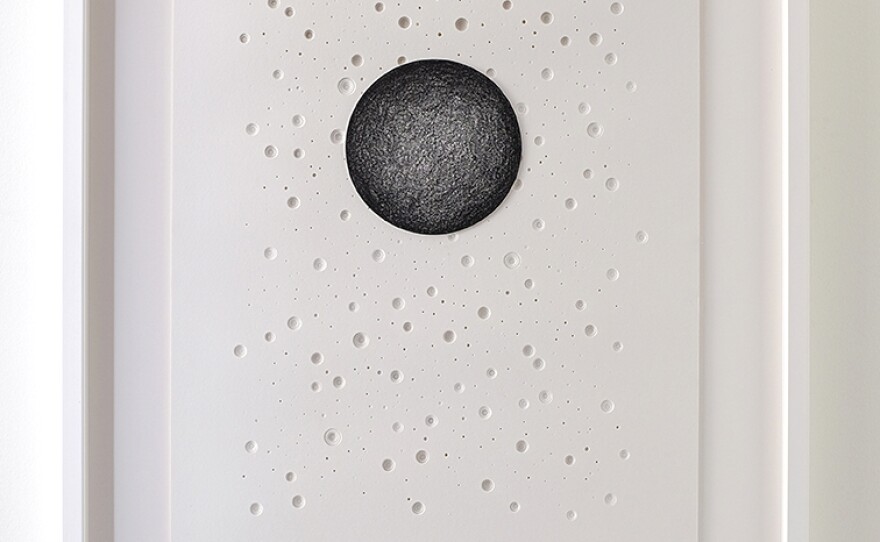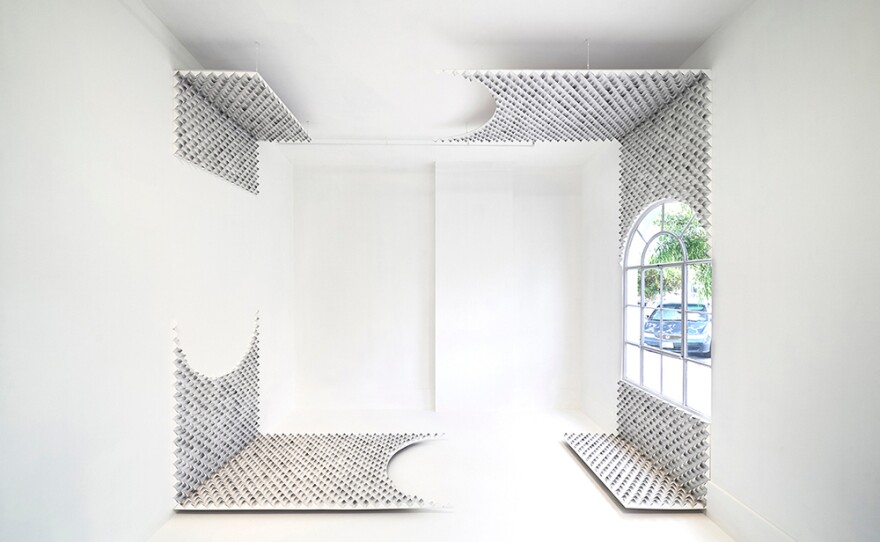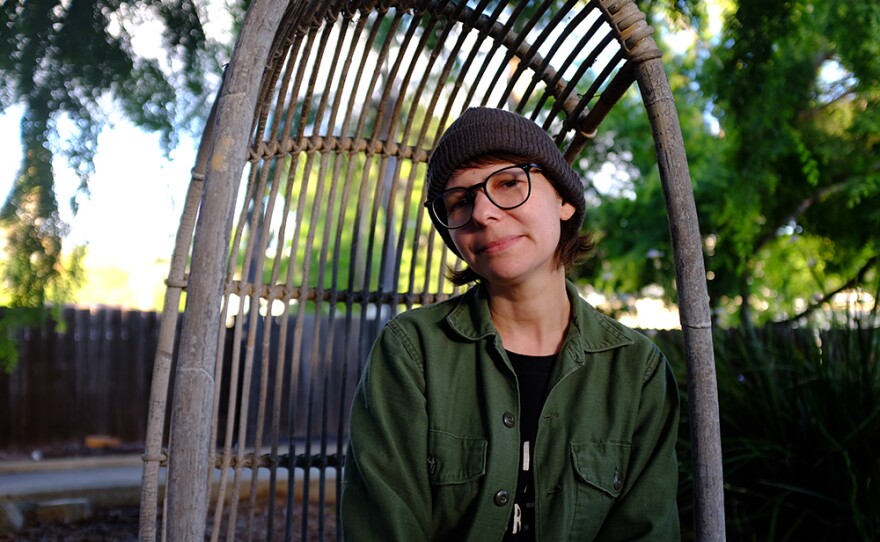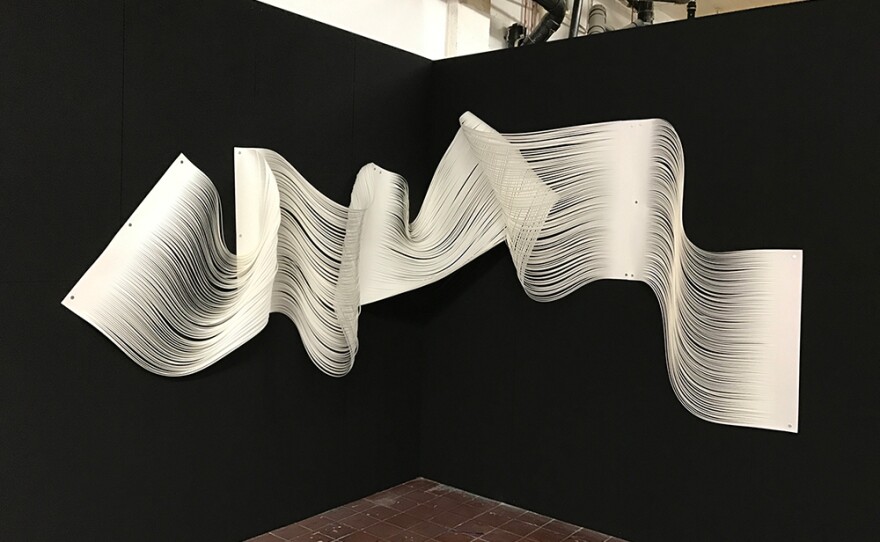Being inspired by the night sky is the stuff of poets … or science fiction stories. But San Diego visual artist Melissa Walter isn't just waxing poetic about supernovas and neutron stars. As a long-time science illustrator for NASA's Chandra X-ray Observatory, she knows her stuff.
When Walter first started working for NASA, it was just a job. She didn’t have a science background, but stuck with it for fifteen years. “I had this really long career working with Chandra, doing their visuals, promotional materials, educational materials,” said Walter. She finally decided to shift gears and focus on her own art practice. “I honestly was like, okay, I am not gonna deal with supernova and black holes ever again.”
Suffice it to say, she spoke too soon.
It wasn’t until several years later that she began resuming the connections between her prior work and her art. She remembers working on one piece and realizing it resembled a neutron star, another a supernova. It prompted her to “read up on neutron stars again" to get her facts in order, but she still didn’t see it as the seed of a new style of art. “This was just a one-time thing,” she had convinced herself.
But it was the connections to those objects that she had been working with for so many years at NASA that drove her to continue. She kept finding them in her art, and realized that space — and its science — was a fountain of inspiration.

Walter’s work is subtle, often inviting a viewer to lean in close. Some are compact, crisp, white sheets of paper cut and layered, and sometimes, the only shape or form is found in the relief or the shadows. Other times, she forms massive installations, showcasing her unmistakable inclination towards white paper, shadows and shapes but serving up splashes of color, film, metal and other materials here and there.
And then there’s the science. Each piece, regardless of its galactic origins, brims with a sense of heuristic curiosity and calculation that seems at times at odds with its organic beauty — but then again, that brings us back to the poets and their stars again.
Last summer, Walter showed what she described as her most ambitious work yet in Barrio Logan’s ICE Gallery. "Of All Things" was a large-scale installation work, involving hundreds of small tetrahedrons, cut, folded, glued, shaded and individually affixed directly to the museum’s walls by Walter and the occasional volunteer — she’d posted a request for folding buddies on social media early on, vaguely; the unveiling of the finished piece had a long-awaited secrecy that could've toed the line to hype, but instead just seemed to give the San Diego arts community a chance to cheer on one of the scene's biggest cheerleaders, fold-by-fold.

She’s recently shown her work across the globe, including a show in Copenhagen and even her first piece of performance art in a virtual exhibition with Pluto Projects — where some works still remain for sale via auction.
Walter has worked from home since 2002 — her day job and her art studio — so the pandemic hasn't affected her work much. "Being home all the time is not a new thing for me. I’m still able to be productive and get stuff done," she said. But one impact is that Walter is one of four official finalists for this year's San Diego Art Prize, and the program was set to launch a special group show of brand new work from each of the four finalists — all women — at the Athenaeum this month.
Walter had already finished the work she intended to show for the Art Prize. Her new works mark a shift for her: not just studying science, but considering our role in it. "Rather than think specifically on celestial objects or scientific theory, I really started thinking of the morality of space travel."
The shift came from a place of process, too, and represents something much more visceral than any other works she's done in the past. "I think even before we were all sort of locked in, I wasn't feeling comforted anymore by getting my ruler out and trying to be precise and clean and perfect with my work." She's also ruled out the type of gruelling, time-intensive installation work from "Of All Things," for the time being, unless they're commissions.

For the San Diego Art Prize, curator Chi Essary said this week that the exhibition will be rescheduled until the fall, set to open September 3 at Bread & Salt. This year's prize will veer away from the project's historical format, where they paired two emerging artist finalists with established artists for a collaborative residency. This year, all four finalists are emerging artists and each receives a cash prize and group exhibition, culminating in more for the eventual winner.
RELATED: Meet The Women Of The San Diego Art Prize
Whether Walter's already finished, space morality pieces will be what end up in that show remains to be seen. "I'm curious to know myself!" she said.
The uncertainty of COVID-19's impact on the industry also isn't new for Walter. "Being an artist, your life is up in the air all the time, you know? You never really know where the opportunities are gonna come from or if they're gonna work out," she said.
Maybe it's Walter's science side talking, but that uncertainty breeds a pragmatic approach to creating art anyway. "It's part of being creative; we're problem solvers," she said. "We hit a wall and we climb it, or go through it, or build a house out of it. That's what we do."






